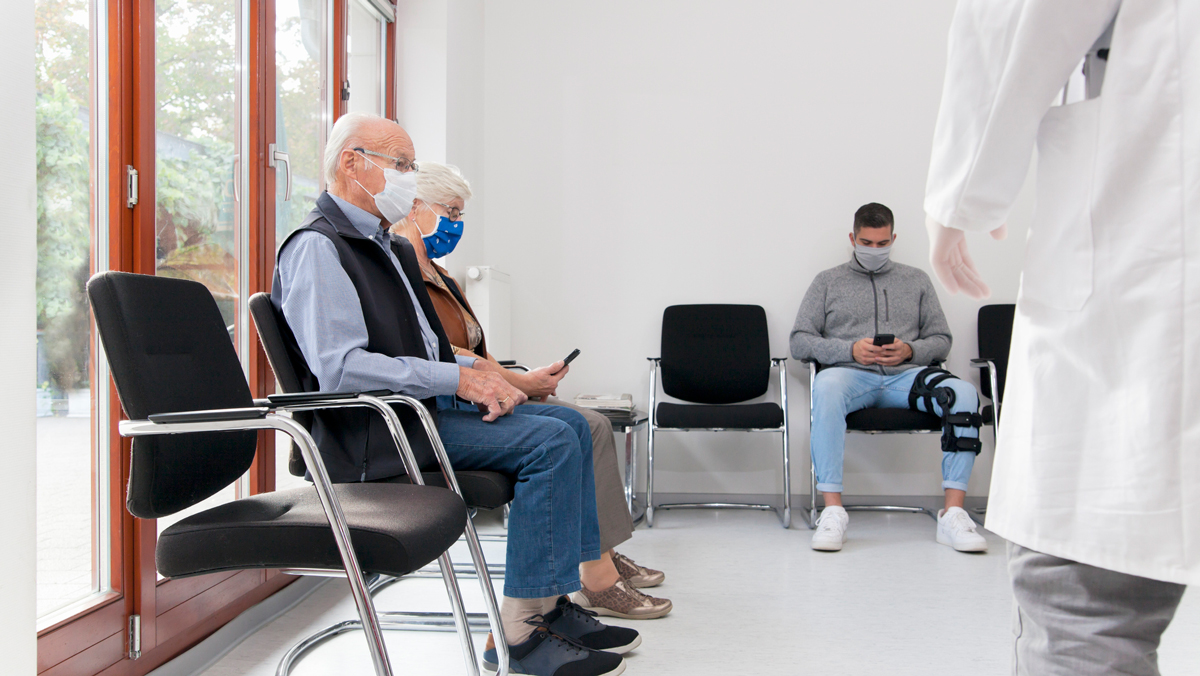COVID-19 lessons for how pharma should support patient advocacy

Trio Health's Neil McGregor-Paterson asks whether the healthcare industry has paid enough attention to the patient voice during COVID-19 and looks at the many ways pharma can improve the patient experience across the sector going forward.
Never has the health and care voluntary sector (HCVS) played such a critical role in supporting our nation´s health and wellbeing. Since the start of the COVID-19 pandemic, the sector has stepped up – and in – to deliver support and services where the NHS and social services were unable to. All with a speed and agility that could never be replicated by providers.
Even now, the sector continues to plug services while NHS and social care retains its focus on COVID-19. But this level of involvement cannot and will not last. And, as the sector plans for a precarious and challenging future, there are several established and emerging themes that can help inform pharma on approaches to support it.
The importance of the long-term and sustainability
A recent report from National Voices, The Neurological Alliance and the Arthritis and Musculoskeletal Alliance showed that while there had been a significant increase in demand for HCVS services supporting those with long-term conditions, the pandemic has had a devastating effect on the sector’s finances. Of the 40 organisations that participated in their research, almost a third predicted a 40% drop in fundraising income in the period June 2020 to June 2021, and a further third a 25% drop.
Commenting on the current and future funding challenges facing the HCVS, Colin McGregor-Paterson, CEO for Oasis Partnership, a charity providing social and psychological support services to improve health and wellbeing, said, “The crisis in funding has significantly impacted on many organisation’s capacity and capability to deliver in the here and now, while challenging the sustainability of many. Collaboration with industry has never been more important, and this needs a commitment to the longer-term if the UK’s vibrant advocacy sector is to be sustained."
This is a sentiment backed up by Annabel Cowper, director of corporate affairs at Biogen: “As we move beyond the acute COVID-19 crisis, it's important that our industry understands the significant pressure the patient advocacy sector is under. Our support for the sector has never been more critical, but in a funding constrained environment, this support needs to be carefully targeted if we are to maximise patient gain."
Keeping the patient voice centre stage
Health and social care policy makers and providers are committed to ensuring that the voice of those with lived experience, and those organisations that advocate for them have a place around the planning table. Yet, considering the greatest crisis this country has faced since the second world war, the voice of the patient and their advocates appears to have been noticeably absent in national COVID-19 planning.
Who knows if things might have been different had policy makers and their advisors listened to the voice of patients? Maybe peoples’ fear of using NHS services during the pandemic would have been predicted and mitigated from the outset, possibly preventing thousands of avoidable deaths.
For industry, this should serve as a salutary reminder of the importance of listening to the voice of patients and their advocates as plans are being developed and signed-off for 2021 and beyond.
Addressing health inequalities
Even before COVID-19, in the UK there was a persistent 20-year gap in the number of years lived in good health between those living in the most and least affluent areas. And, for the first time in a decade, life expectancy has stalled for many, and declined for the poorest 10% of women.
COVID-19 has exacerbated health inequalities, while exposing the fact that underlying health inequalities, while not new, have been overlooked for a long time. This has resulted in an increased focus on addressing these among policy makers, providers and importantly the HCVS.
While pharma has a great track record in supporting equity of access to medicines and services, the need for improved data, measurements, reporting, and comparisons, coupled to the complexity of addressing health inequalities means that ex-US, pharma has traditionally steered clear of bespoke health inequalities initiatives beyond health literacy type projects and/or funding for third party organisations. However, times have changed, and just as the HCVS is increasingly stepping up to help address health inequalities, so companies focused on those conditions that disproportionately affect poorer and disadvantaged communities must also step up and collaborate with them.
“The pharmaceutical industry could become an important voluntary sector partner in addressing health inequalities if it is prepared to go beyond patient advocacy and get behind whole communities that are taking action that increases resilience and creates health," said Merron Simpson, chief executive of New NHS Alliance, a national cross sector movement addressing health inequalities through Health Creation. "On a practical level there are several roles they could play such as supporting digital literacy or helping communities get access to and interpret local datasets. The most important thing is to listen to the priorities of local people."
Community up vs. national down
The people and community response to COVID-19 has been phenomenal. Beyond the NHS Volunteer Responders programme, three million people collaborated with local organisations outside the system. They came together with speed to self-organise and meet the specific needs of their communities. From streel-level WhatsApp groups to locality-wide delivery of medicines, the benefits of community resilience have been recognised at the highest levels of government, while its link to digital health and power shifting to communities has been made.
In his report to the Prime Minister, entitled Levelling up our communities: proposals for a new social covenant, Danny Kruger MP, recognises that: “The experience of the recent crisis – the willingness of local people to step forward and collaborate, the flexibility shown by public services and the social commitment of businesses – shows what is possible. Add the extraordinary new dynamics of data and digital innovation, and a wholly new paradigm is possible in which community power replaces the dominance of remote public and private sector bureaucracies."
Commenting on the implication of Kruger’s report on UK pharma, Paul Naish, director of UK policy at AstraZeneca said: “The Kruger report flags the importance of digital – where our industry is already highly active – but also issues that should be a clarion call for pharma to advance community collaboration within, and alongside our deep commitment to established patient organisations. This way we can support people to be healthy in addition to supporting patients to be well.”
Creating health alongside prevention and treatment
COVID-19 has demonstrated the value of resilient and connected communities, while reinforcing that creating health within communities must sit alongside prevention of ill health and treating illness through medicines and services. Creating health is not new, but it is effective, and it is cost effective. It is also an area that pharma should be actively involved in.
Commenting on the potential role of pharma in creating health, Lord Nigel Crisp, former chief executive of NHS England, and author of the recently launched, Health in made at home, hospitals are for repairs, said, “The NHS can’t by itself deal with many of today’s major health problems such as loneliness, stress, obesity, diseases of poverty and addictions. It can only react, doing the repairs but not dealing with the underlying causes.
“The pharmaceutical industry has a great track record in working with the NHS in treating and preventing illness through medicines, vaccines and support for services. But, since healthcare provided by the NHS accounts for only 10-20 percent of a population’s health, the industry needs to think about collaborating more widely with the health and care voluntary sector to support the creation of health in schools, homes, communities and the workplace. This will have the added benefit of reducing the burden on the NHS."
The value of digital as a connector and enabler
COVID-19 has had a super booster effect on the adoption of digital technology to support patients. It has also led to a shift in attitude in the healthcare setting, with providers wanting patients to take greater responsibility for their own health and wellbeing with technology. This is turn is matched by a stepping-up of the use of technology by the HCVS in terms of better connecting people and communities, reaching out to communities, taking services and support online, and launching new services such as Zoom exercise classes. In addition, the sector has been actively breaking down barriers to digital exclusion through training, supporting funding of technology and targeted outreach to vulnerable, disadvantaged, and isolated communities who would otherwise not be engaged in digital and digital health.
Commenting on the role of pharma in further supporting advocacy in this digital space, Mindy Daeschner, chief executive of Daeschner Consulting and author of What’s next in digital healthcare transformation post COVID-19, said, “We know that industry has made a significant contribution to digital health and to supporting organisations up their digital capacity and capabilities. However, digital is just another means of providing patients with choice, and it must not become the default position. COVID-19 has made it clear that digital exclusion is and will remain a challenge for some, while for many patient’s people interaction is critical. Supporting digital initiatives that enhance choice and people interaction must be a key consideration."
Building Better Together
As countries focus on Building Back Better, New NHS Alliance has been quick to point out that this means Building Better Together. There is a great opportunity for pharma to revisit and refocus advocacy programmes to support the HCVS to continue building connectivity within communities.
COVID-19 has radically changed the environment within which the HCVS sector operates and this must be understood and reflected by industry. At the heart of this is listening to the voice of organisations, but in today’s word, industry must take this one step further and listen to the voice of people and the communities the HCVS represent.
About the author
Neil McGregor-Paterson is director of connections and collaboration for Trio Health.













